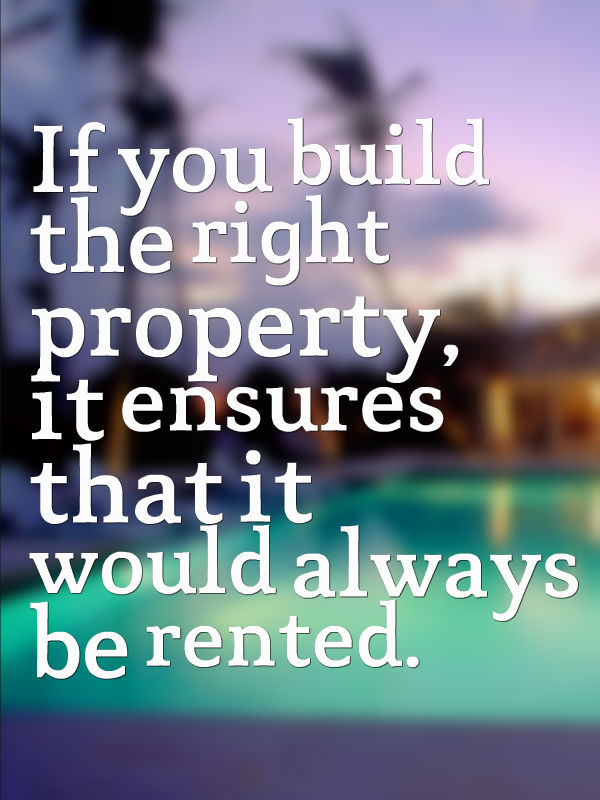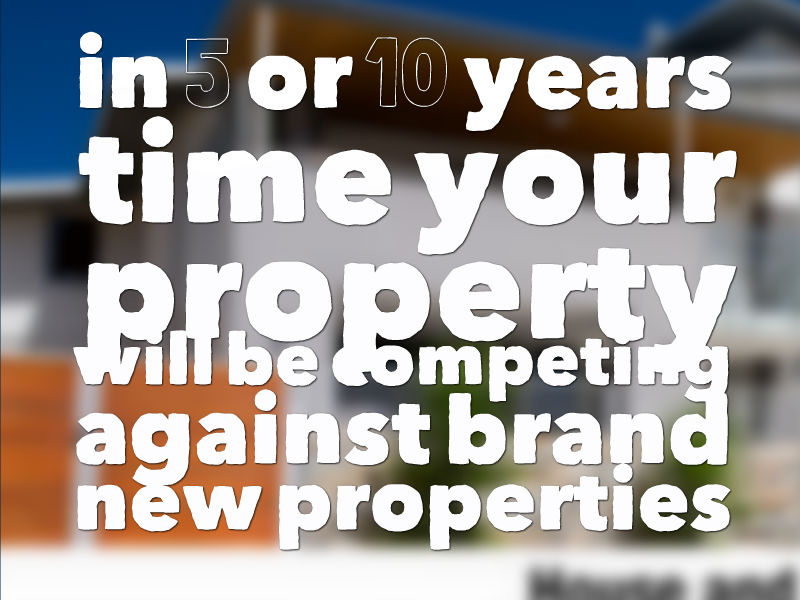The Pros and Cons Of Building An Investment Property (Ep153)
Today I want to go through the pros and cons of building your own investment property rather than purchasing an established investment property.
I am talking about either:
- Purchasing a piece of land and getting your own builder
- Getting someone like Masterton Homes or Coral Homes to come and build it or
- Obtaining a house and land package
The Pros
Let’s start by looking at the pros of building an investment property.
1. Great Depreciation
When a property is newly built you get to depreciate the cost of the construction of that building over a number of years. But you also get to depreciate the internal fixtures and fittings because everything is brand new and you’re able to claim maximum depreciation for those items.
This great depreciation can mean that if you’re property is negatively geared it could actually turn it into a positively geared property. Or if you are positively geared it saves the amount tax that you have to pay.
Just a disclaimer always go and see a professional accountant for anything to do with tax. This information is for educational purposes only and should not be considered taxation advice.
2. You Can Build It For The Market

So you’re building an investment property from scratch. This process would allow you to do research and talk to real estate agents to understand exactly what the market wants and what the market is willing to pay a premium for.
If you build the right property, it ensures that it would always be rented and that you get the rental yield that you’re after.
3. It Could Be Cheaper Than an Established Investment Property
If you can get a good deal on the land and the build, the property could be cheaper. A lot of people aren’t willing to put in the effort and go through the construction. Therefore they will pay more for an established property.
However, if you build the right property for the right price it can actually be cheaper than buying a similar property that is already being built.
4. The Potential For Instant Equity
Instant equity means that after you’ve purchased the land and built the property you can go back to your lender and get that property re-valued. If you’ve done the job correctly and payed a great price for the right property, then you could actually add value to that property straight away and get instant equity. That equity can then be used for other purposes such as potential leverage into more properties
5. Could Be Built For Dual Occupancy
You have the potential to build the property so that it could house more than one tenant or be subdivided in the future. The house could also be perfectly positioned for you to build a granny flat as well.
When purchasing an established property it’s much harder to move the entire property but if you’ve got a blank slate, then you can build that house virtually wherever you want and set it up to give you the best potential future opportunities.
The Cons
Now let’s have a look at the cons of building your own investment property rather than purchasing an established property.
1. You Are Limited In Location
Chances are you’re going to want to buy a block of land rather than a block of land with the house on it because you’re going to have to pay more for it. However vacant land is limited. If you’re purchasing in Sydney, then you’re going to be extremely limited in where you can purchase vacant land and even in areas like the Gold Coast.
There are going to be certain spots where there’s new land releases, but apart from that it’s going to be very difficult to find a vacant block.
2. Other Developments In The Area May Hinder Growth

If you’re purchasing in a new land release area that has potential for future land releases, that could actually hinder the growth of your property because of all the competition.
Property works on a demand and supply model and when there is more demand than there is supply, prices tend to go up. But if there’s constant supply being added to the market with new land releases and new properties, that’s going to make your property harder to grow in value.
It also means that in 5 or 10 years time your property (which would be 5 to 10 years old) will be competing against brand new properties which could affect the potential capital growth of your property.
3. No Income Until The Property Is Finished
You won’t have any income until the properties are finished which means you are going to be paying your own home mortgage or rent (depending on what your situation is) on top of costs for the property.
You will be paying for this new investment property as well as the land and construction costs as each part of the project is finished. It’s only once the project is completely finished, signed off and ready to move in that you can get tenants and start earning income.
Therefore you need to prepare for that period of about 6 to 12 months or more where you’re going to have the expenses of an investment property without any income from the property.
4. Potential Issues With The Build Could Increase Budget
It’s very rare that a build is going to go 100% to plan and issues generally cost you extra money. Make sure you work with your builder because you can get a fixed contract so that you pay a fixed amount of money for the build. That way if issues happen you’re somewhat protected.
Obviously though there will always be things outside your control and even if it doesn’t cost you any extra for the build, there is added time. Additionally you’ve got added interest repayments when you’re not getting any rental income so it ends up costing you extra anyway.
There you have some pros and cons of building an investment property versus an established one. Obviously one is not better than the other as it depends on:
- What your circumstances are
- What you want to get out of it and
- What the property is
Because some new-build properties are great deals (whereas others are really just ripping you off.) You really need to assess it on a deal by deal basis as well as your situation.
I hope that this episode gives you some food for thought to decide whether you want to go for a new-build property or whether you want to try an existing property that you can build up for more income.
DISCLAIMER No Legal, Financial & Taxation Advice
The Listener, Reader or Viewer acknowledges and agrees that:
- Any information provided by us is provided as general information and for general information purposes only;
- We have not taken the Listener, Reader or Viewers personal and financial circumstances into account when providing information;
- We must not and have not provided legal, financial or taxation advice to the Listener, Reader or Viewer;
- The information provided must be verified by the Listener, Reader or Viewer prior to the Listener, Reader or Viewer acting or relying on the information by an independent professional advisor including a legal, financial, taxation advisor and the Listener, Reader or Viewers accountant;
- The information may not be suitable or applicable to the Listener, Reader or Viewer's individual circumstances;
- We do not hold an Australian Financial Services Licence as defined by section 9 of the Corporations Act 2001 (Cth) and we are not authorised to provide financial services to the Listener, Reader or Viewer, and we have not provided financial services to the Listener, Reader or Viewer.
"This property investment strategy is so simple it actually works"
Want to achieve baseline financial freedom and security through investing in property? Want a low risk, straightforward way to do it? Join more than 20,000 investors who have transformed the way they invest in property."
